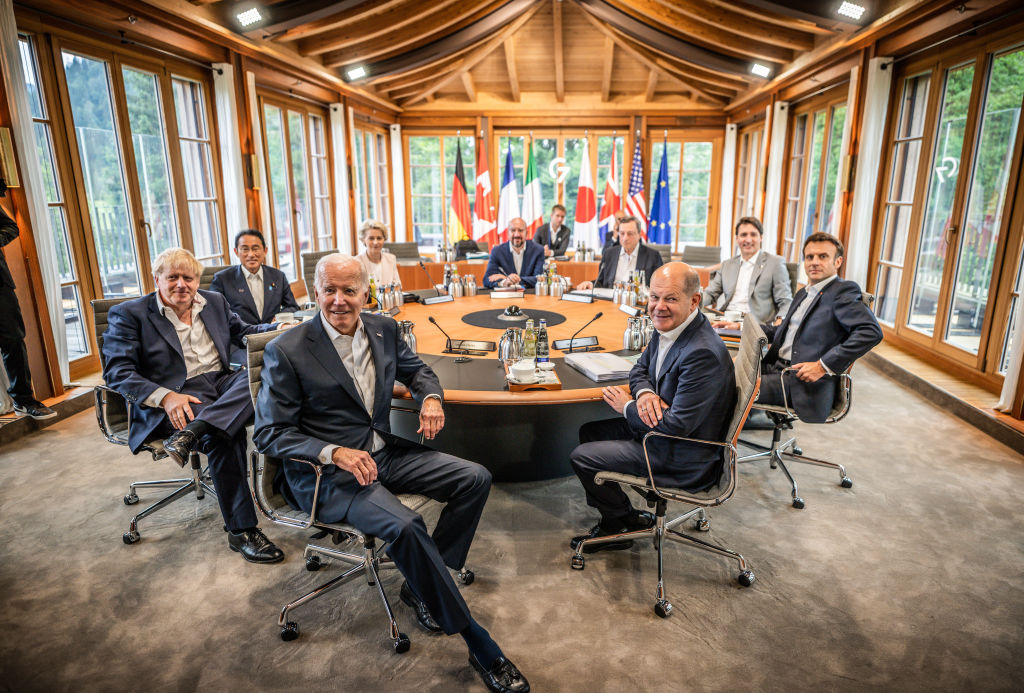
Leaders of the world’s most advanced economies have agreed to start a Climate Club where members agree on joint rules and standards in the fight against global warming with the hope that it will avoid spats over green tariffs.
The Group of Seven nations reached a deal on the issue at a three-day summit in Bavaria, Germany, that ended on Tuesday. It’s a significant achievement for German Chancellor Olaf Scholz, who has made better coordination on climate protection measures a key theme of his G-7 presidency.
“We note with concern that currently neither global climate ambition nor implementation are sufficient to achieve the goals of the Paris Agreement,” the final G-7 leaders said in a statement. The Climate Club will address that by “accelerating climate action and increasing ambition, with a particular focus on the industry sector.”
Scholz has argued that the Climate Club would help eliminate a chaotic patchwork of national regulations that could increase the risk of new trade conflicts as countries slap levies or tariffs on imports deemed less sustainable. It will also potentially help mitigate disadvantages faced by companies doing business in regions with more ambitious carbon-reduction goals, and put pressure on non-members to adopt stricter climate protection measures.
The Organisation for Economic Co-operation and Development, the International Monetary Fund and the World Bank are supportive of the effort. Currently, the members of the club only include the G-7, leaving out major polluters including China, India, Indonesia and South Africa.
The G-7 leaders said the Climate Club will be “inclusive in nature and open to countries that are committed to the full implementation of the Paris Agreement.” They encouraged large emitters, Group of 20 members and other emerging economies to “intensify discussions and consultations with us on this matter.”
Still, questions over how the Climate Club will function in practice need to be ironed out by the end of the year. The IMF has previously advocated setting a minimum price floor for carbon emissions. In theory, this would only require a small number of large emitters to sign up in order to cover around 85% of global carbon pollution. But it runs the risk of clashing with Germany’s goal to create an open and collaborate system that doesn’t exclude developing countries.
There are also concerns about equity, with the European Union’s plans for a carbon border levy set to make it much harder for the poorest nations to export certain carbon-intensive products to the bloc. And there are methodological challenges, such as how to include countries such as the US that currently don’t put a price on carbon. As a start, the Climate Club could focus instead on targeting certain high-emitting sectors, such as steel or cement. Other areas of cooperation, including the production and trade of hydrogen could also be included.
While some experts have praised the concept and its fundamental goal of increasing cooperation, success will depend on how inclusive the group will be and how rules and standards will be negotiated as it grows.
“It is an example of the kind of different forms of global collaboration we need to actually help countries decarbonize their particularly industrial sectors,” said Alex Scott, a program leader at climate think tank E3G. “It could be a potentially really impactful idea, but it needs to be designed beyond just the G-7 countries themselves.”
More Must-Reads from TIME
- How Donald Trump Won
- The Best Inventions of 2024
- Why Sleep Is the Key to Living Longer
- Robert Zemeckis Just Wants to Move You
- How to Break 8 Toxic Communication Habits
- Nicola Coughlan Bet on Herself—And Won
- Why Vinegar Is So Good for You
- Meet TIME's Newest Class of Next Generation Leaders
Contact us at letters@time.com